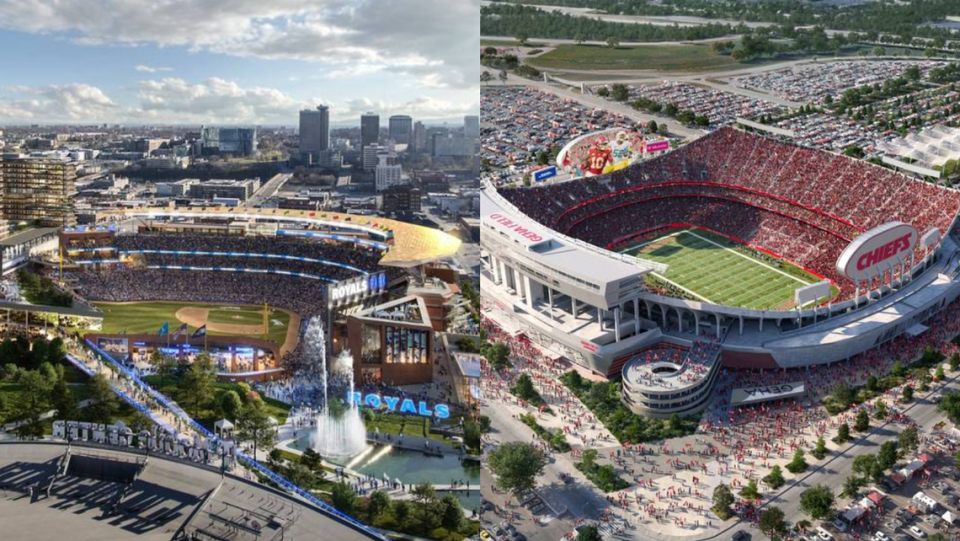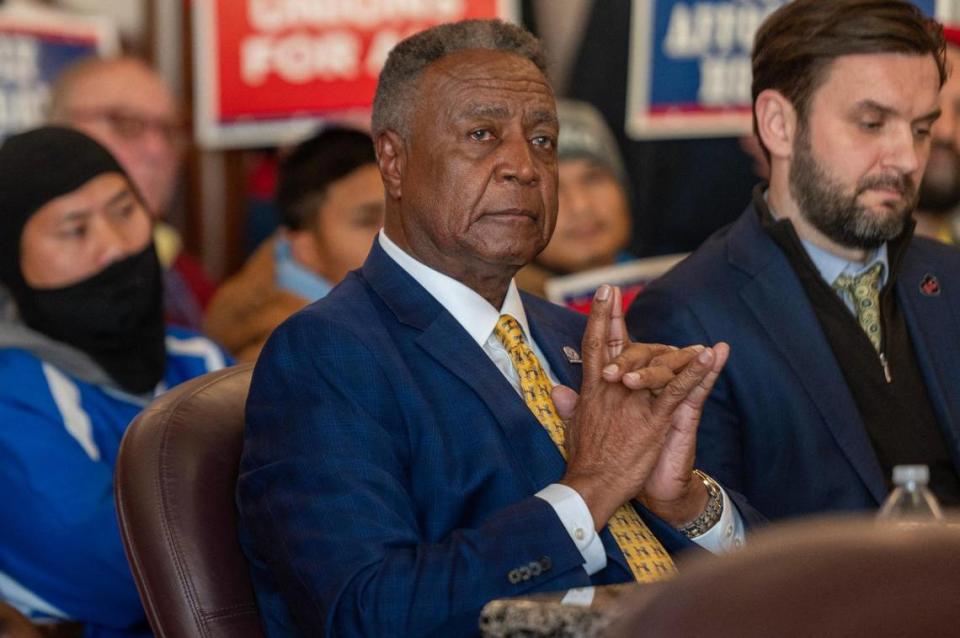Royals and Chiefs attack Frank White for suggesting they pay for sales tax election
Jackson County Executive Frank White Jr. wants the Royals and Chiefs to pay the nearly $1 million it has cost county taxpayers to put the stadiums sales tax measure on the April 2 ballot.
Noting that the tax, if passed, will generate more than $2 billion over its 40-year life for the benefit of the teams, White sent a letter on Thursday to Chiefs owner Clark Hunt and Royals majority owner John Sherman asking them to cover the cost of having the election.
The teams responded on the social media platform X by attacking the motives of White, who while playing second base for the Royals won eight Gold Glove Awards and was part of the team that won 1985 World Series. They the Royals Hall of Famer “has repeatedly tried to prevent the Chiefs and Royals from staying in Jackson County.”
The post continued:
“The Chiefs and the Royals are focused on finalizing leases and a CBA to extend and enhance our 50-year partnership with Jackson County, including more than $1.3 billion in private funding committed between the two teams that will spur thousands of jobs and hundreds of millions in labor income annually. All with no increase in taxes. Political antics should not stand in the way of those benefits”
Spokespersons for the team did not respond to The Star’s requests for a direct response to whether they would pay for the election..
Revenue from the tax would help pay for a portion of the costs of building a new estimated $2 billion Royals stadium and ballpark district in Kansas City’s East Crossroads neighborhood and cover a sizable amount of the $800 million renovation the Chiefs have planned for Arrowhead Stadium.
Currently, the county’s plan is to reimburse itself for the election costs from revenues received from the new sales tax. But if the ballot measure fails, county government would bear that cost. It can’t come out of the revenues generated by the current 3/8th-cent sales tax, which is earmarked for paying off the debt incurred in 2006 for the renovations of Kauffman and Arrowhead Stadiums., as well as for reimbursing the teams for stadium operations, maintenance and repairs.

If Question 1 passes, the current tax would be repealed and a new 3/8th-cent tax would take effect. If the measure fails to pass, then the current tax would run until September 2031.
If approved, a resolution on the agenda for Monday’s regular meeting of the county legislature would instruct the county’s finance director to issue the Kansas City Election Board a check for $745,153 and one for $235,850 to the Jackson County Election Board as the county’s share of holding the election.
Cities and school districts within the county also have things on the ballot and pay a proportional share.
County government has nothing on the ballot other than the stadium issue, and those elections costs were not built into the county’s annual budget, White said.

“As the steward of Jackson County’s fiscal health and community welfare, I am faced with the immediate concern of covering the $1,000,000 cost associated with conducting this unplanned special election—an expenditure not budgeted for in our fiscal year 2024 budge,” White said in his letter. “This unforeseen expense necessitates consideration of drawing from our emergency reserves, a decision that poses a significant dilemma given our commitment to safeguarding the county’s financial stability.”
The county legislature approved this year’s budget on Dec. 18, a month and a day before legislators voted to override White’s veto and put Question 1 on the April ballot.
Some county legislators who voted to put the measure on the ballot criticized what they called White’s request for reimbursement with only two weeks before the election.
Manny Abarca, who represents the 1st District and has often been at odds with White, said he is not opposed to the teams paying for the cost of the election, but he worries that this issue could have an impact on the community benefits agreement that the teams are still hashing out with the county and other interests groups on issues like fair wages and affordable housing.
“I wished he would have been this engaged months ago,” Abarca wrote in a text message, referencing the criticism that White allegedly refused to seriously negotiate with the teams on stadiums issues last fall. On Steve Kraske’s Up to Date program Thursday morning, Sherman also criticized White for that.
“It was a frustrating process,” Sherman said. “He would not engage, would not sit down at the table and refused to negotiate. And it became clear in the process that, you know, we had to go direct to the legislature, and, you know, against the county executive’s recommendation, they voted ...to put the question on the ballot.”
Legislator Sean Smith, 6th District, said in a phone interview and exchange of text messages that he felt that there were more important issues at stake than the cost of the election.
“There are good substantive arguments for and against this ballot question,” he said. “It’s a shame that both parties on both the YES and NO sides are muddying the waters with misleading info.”

